最新版湘教九年级英语 Units (1-2)Unit 2精品教案U2T1SA
- 格式:doc
- 大小:97.50 KB
- 文档页数:11

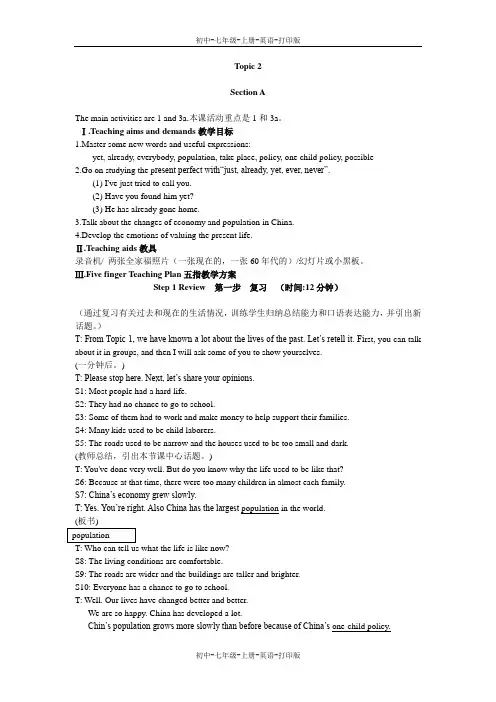
Topic 2Section AThe main activities are 1 and 3a.本课活动重点是1和3a。
Ⅰ.Teaching aims and demands教学目标1.Master some new words and useful expressions:yet, already, everybody, population, take place, policy, one child policy, possible2.Go on studying the p resent perfect with“just, already, yet, ever, never”.(1) I've just tried to call you.(2) Have you found him yet?(3) He has already gone home.3.Talk about the changes of economy and population in China.4.Develop the emotions of valuing the present life.Ⅱ.Teaching aids教具录音机/ 两张全家福照片(一张现在的,一张60年代的)/幻灯片或小黑板。
Ⅲ.Five finger Teaching Plan五指教学方案Step 1 Review 第一步复习(时间:12分钟)(通过复习有关过去和现在的生活情况,训练学生归纳总结能力和口语表达能力,并引出新话题。
)T: From Topic 1, we have known a lot about the lives of the past. Let’s retell it. Fi rst, you can talk about it in groups, and then I will ask some of you to show yourselves.(一分钟后。

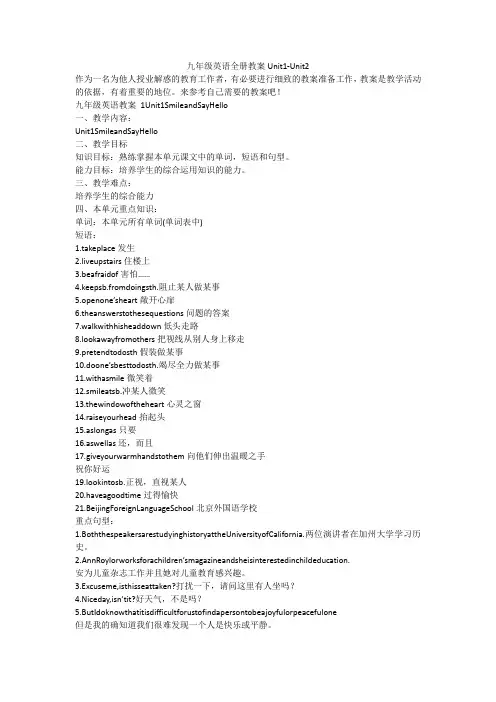
九年级英语全册教案Unit1-Unit2作为一名为他人授业解惑的教育工作者,有必要进行细致的教案准备工作,教案是教学活动的依据,有着重要的地位。
来参考自己需要的教案吧!九年级英语教案1Unit1SmileandSayHello一、教学内容:Unit1SmileandSayHello二、教学目标知识目标:熟练掌握本单元课文中的单词,短语和句型。
能力目标:培养学生的综合运用知识的能力。
三、教学难点:培养学生的综合能力四、本单元重点知识:单词:本单元所有单词(单词表中)短语:1.takeplace发生2.liveupstairs住楼上3.beafraidof害怕……4.keepsb.fromdoingsth.阻止某人做某事5.openone’sheart敞开心扉6.theanswerstothesequestions问题的答案7.walkwithhisheaddown低头走路8.lookawayfromothers把视线从别人身上移走9.pretendtodosth假装做某事10.doone’sbesttodosth.竭尽全力做某事11.withasmile微笑着12.smileatsb.冲某人微笑13.thewindowoftheheart心灵之窗14.raiseyourhead抬起头15.aslongas只要16.aswellas还,而且17.giveyourwarmhandstothem向他们伸出温暖之手祝你好运19.lookintosb.正视,直视某人20.haveagoodtime过得愉快21.BeijingForeignLanguageSchool北京外国语学校重点句型:1.BoththespeakersarestudyinghistoryattheUniversityofCalifornia.两位演讲者在加州大学学习历史。
2.AnnRoylorworksforachildren’smagazineandsheisinterestedinchildeducation.安为儿童杂志工作并且她对儿童教育感兴趣。

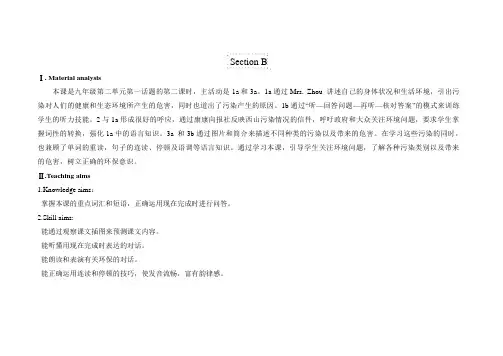
Section BⅠ. Material analysis本课是九年级第二单元第一话题的第二课时,主活动是1a和3a。
1a通过Mrs. Zhou 讲述自己的身体状况和生活环境,引出污染对人们的健康和生态环境所产生的危害,同时也道出了污染产生的原因。
1b通过“听—回答问题—再听—核对答案”的模式来训练学生的听力技能。
2与1a形成很好的呼应,通过康康向报社反映西山污染情况的信件,呼吁政府和大众关注环境问题,要求学生掌握词性的转换,强化1a中的语言知识。
3a 和3b通过图片和简介来描述不同种类的污染以及带来的危害。
在学习这些污染的同时,也兼顾了单词的重读,句子的连读、停顿及语调等语言知识。
通过学习本课,引导学生关注环境问题,了解各种污染类别以及带来的危害,树立正确的环保意识。
Ⅱ.Teaching aims1.Knowledge aims:掌握本课的重点词汇和短语,正确运用现在完成时进行问答。
2.Skill aims:能通过观察课文插图来预测课文内容。
能听懂用现在完成时表达的对话。
能朗读和表演有关环保的对话。
能正确运用连读和停顿的技巧,使发音流畅,富有韵律感。
3.Emotional aims: (optional)引导学生关注环境问题,树立绿色环保意识,增强忧患意识和社会责任感。
4.Culture awareness: (optional)通过谈论环境问题,让学生了解不同种类的污染及其危害。
Ⅲ. The key points and difficult points1. Key points:Words and phrases: pain, produce, awful, bear, harmful, chest, editor, breathe/breath, soilget a pain in…, what’s worse, too much noise, too many problems, breathing problem, be harmful to, make a mess of,throw…aroundSentences: It’s difficult for me to breathe.I’ve got a pain in my throat.It’s really awful.A: How long have you been like this? A: Have you seen a doctor?B: I’ve been like this since la st week. B: Not yet.Grammar: Present Perfect的问答。
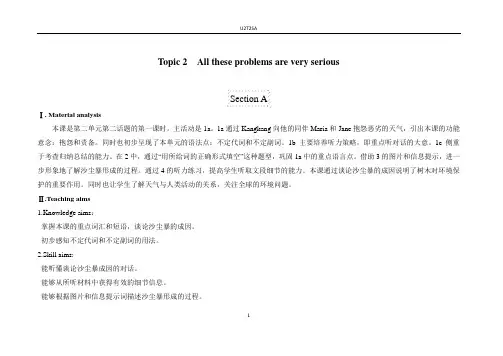
U2T2SA1Topic 2All these problems are very seriousSection AⅠ. Material analysis本课是第二单元第二话题的第一课时。
主活动是1a 。
1a 通过Kangkang 向他的同伴Maria 和Jane 抱怨恶劣的天气,引出本课的功能意念:抱怨和责备。
同时也初步呈现了本单元的语法点:不定代词和不定副词。
1b 主要培养听力策略,即重点听对话的大意。
1c 侧重于考查归纳总结的能力。
在2中,通过“用所给词的正确形式填空”这种题型,巩固1a 中的重点语言点。
借助3的图片和信息提示,进一步形象地了解沙尘暴形成的过程。
通过4的听力练习,提高学生听取文段细节的能力。
本课通过谈论沙尘暴的成因说明了树木对环境保护的重要作用。
同时也让学生了解天气与人类活动的关系,关注全球的环境问题。
Ⅱ.Teaching aims 1.Knowledge aims :掌握本课的重点词汇和短语,谈论沙尘暴的成因。
初步感知不定代词和不定副词的用法。
2.Skill aims:能听懂谈论沙尘暴成因的对话。
能够从所听材料中获得有效的细节信息。
能够根据图片和信息提示词描述沙尘暴形成的过程。
九年级上册教学案例设计3. Emotional aims: (optional)让学生了解环境污染的严峻形势,引导学生爱护大自然,爱护花草树木,树立绿色环保意识。
4. Culture awareness: (optional)通过课文的学习,让学生了解沙尘暴形成的原因和过程,关注全球的环境问题。
Ⅲ. The key points and difficult points1. Key points:Words and phrases: sand, although, sandstorm, desert, human being, reduce, completely, change into, stop … from, blow/ wash … away, as a resultSentences: A lot of water can be saved by forests.Although we have built “The Green Great Wall”, we still need to do something to protect the environment.Grammar: Indefinite pronoun and adverb.2.Difficult points:能够从所听材料中获得有效的细节信息来补全句子。
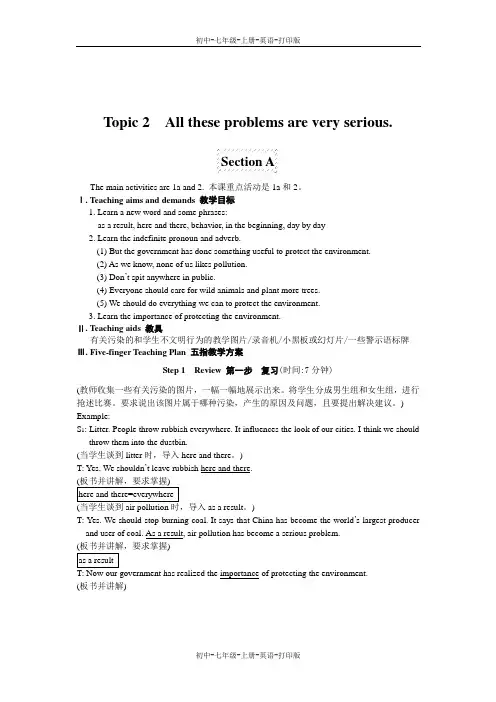
Topic 2 All these problems are very serious.Section AThe main activities are 1a and 2. 本课重点活动是1a和2。
Ⅰ. Teaching aims and demands 教学目标1. Learn a new word and some phrases:as a result, here and there, behavior, in the beginning, day by day2. Learn the indefinite pronoun and adverb.(1) But the government has done something useful to protect the environment.(2) As we know, none of us likes pollution.(3) Don’t spit anywhere in public.(4) Everyone should care for wild animals and plant more trees.(5) We should do everything we can to protect the environment.3. Learn the importance of protecting the environment.Ⅱ. Teaching aids 教具有关污染的和学生不文明行为的教学图片/录音机/小黑板或幻灯片/一些警示语标牌Ⅲ. Five-finger Teaching Plan 五指教学方案Step 1 Review 第一步复习(时间:7分钟)(教师收集一些有关污染的图片,一幅一幅地展示出来。
将学生分成男生组和女生组,进行抢述比赛。
要求说出该图片属于哪种污染,产生的原因及问题,且要提出解决建议。
) Example:S1: Litter. People throw rubbish everywhere. It influences the look of our cities. I think we should throw them into the dustbin.(当学生谈到litter时,导入here and there。
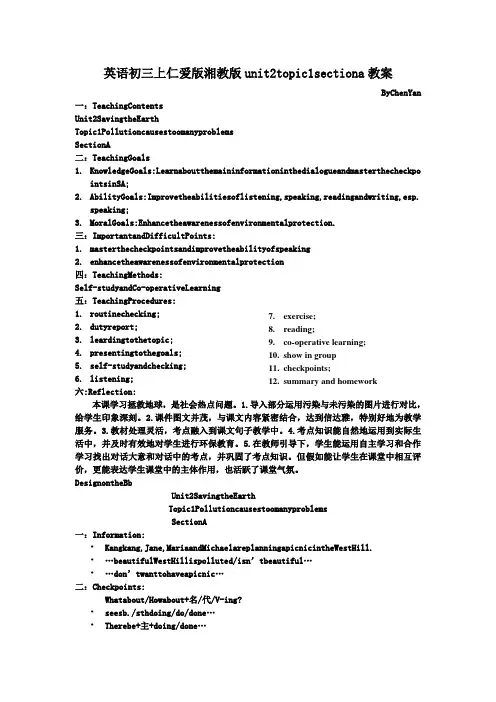
英语初三上仁爱版湘教版unit2topic1sectiona 教案ByChenYan一:TeachingContentsUnit2SavingtheEarthTopic1PollutioncausestoomanyproblemsSectionA二:TeachingGoals1. KnowledgeGoals:LearnaboutthemaininformationinthedialogueandmasterthecheckpointsinSA;2. AbilityGoals:Improvetheabilitiesoflistening,speaking,readingandwriting,esp.speaking;3. MoralGoals:Enhancetheawarenessofenvironmentalprotection.三:ImportantandDifficultPoints:1. masterthecheckpointsandimprovetheabilityofspeaking2. enhancetheawarenessofenvironmentalprotection四:TeachingMethods:Self-studyandCo-operativeLearning五:TeachingProcedures:1. routinechecking;2. dutyreport;3. leardingtothetopic;4. presentingtothegoals;5. self-studyandchecking;6. listening; 六:Reflection: 本课学习拯救地球,是社会热点问题。
1.导入部分运用污染与未污染的图片进行对比,给学生印象深刻。
2.课件图文并茂,与课文内容紧密结合,达到信达雅,特别好地为教学服务。
3.教材处理灵活,考点融入到课文句子教学中。
4.考点知识能自然地运用到实际生活中,并及时有效地对学生进行环保教育。
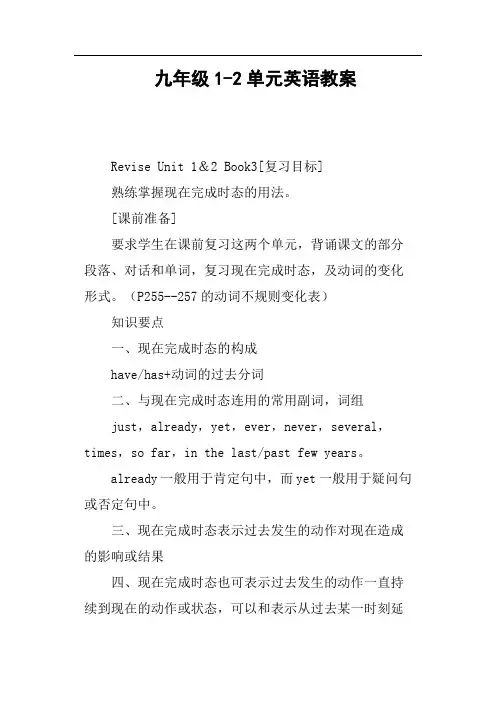
九年级1-2单元英语教案Revise Unit 1&2 Book3[复习目标]熟练掌握现在完成时态的用法。
[课前准备]要求学生在课前复习这两个单元,背诵课文的部分段落、对话和单词,复习现在完成时态,及动词的变化形式。
(P255--257的动词不规则变化表)知识要点一、现在完成时态的构成have/has+动词的过去分词二、与现在完成时态连用的常用副词,词组just,already,yet,ever,never,several,times,so far,in the last/past few years。
already一般用于肯定句中,而yet一般用于疑问句或否定句中。
三、现在完成时态表示过去发生的动作对现在造成的影响或结果四、现在完成时态也可表示过去发生的动作一直持续到现在的动作或状态,可以和表示从过去某一时刻延续到现在(包括“现在”在内)的一段时间的状语连用,常以for和since引导for和表示一段时间的词组连用。
since和表示过去某一时刻的词或词组连用。
Have/has been to 与have/has gone to的区别: Have/has been to意为“已经去过某地,且已回来”,have/has gone to意为“去了某地,但还未回来”。
五、现在完成时态中延续性动词与短暂性动词之间的转换。
现在完成时态可以表示已经发生了的动作持续到现在(包括相应“现在”在内)的动作或状态,但动词必须是延续性动词,因此,如果句子需要现在用现在完成时态,有些短暂性动词要改成相应的延续性动词或词组,常见的有:leave—be away, die—be dead ,buy—have,borrow—keep, open—be open,begin/start—be on,arrive/reach/get—be in, come/go—be in, get up –be upget ill/fall—be ill, join—be in the /be amember of词组1。
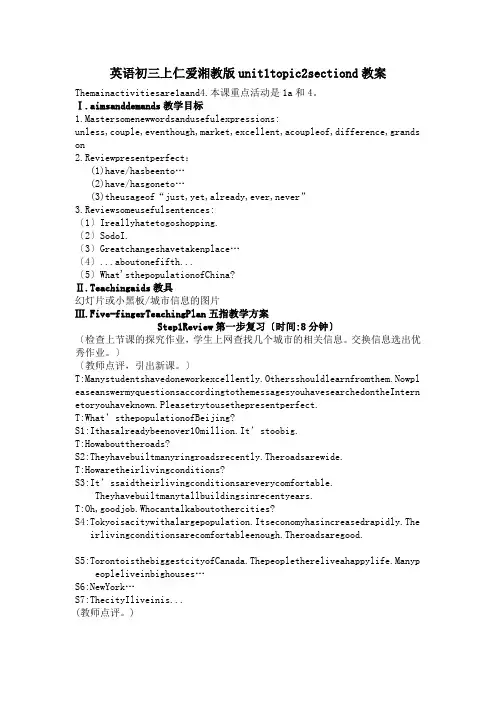
英语初三上仁爱湘教版unit1topic2sectiond教案Themainactivitiesare1aand4.本课重点活动是1a和4。
Ⅰ.aimsanddemands教学目标1.Mastersomenewwordsandusefulexpressions:unless,couple,eventhough,market,excellent,acoupleof,difference,grands on2.Reviewpresentperfect:(1)have/hasbeento…(2)have/hasgoneto…(3)theusageof“just,yet,already,ever,never”3.Reviewsomeusefulsentences:〔1〕Ireallyhatetogoshopping.〔2〕SodoI.〔3〕Greatchangeshavetakenplace…〔4〕...aboutonefifth...〔5〕What'sthepopulationofChina?Ⅱ.Teachingaids教具幻灯片或小黑板/城市信息的图片Ⅲ.Five-fingerTeachingPlan五指教学方案Step1Review第一步复习〔时间:8分钟〕〔检查上节课的探究作业,学生上网查找几个城市的相关信息。
交换信息选出优秀作业。
〕〔教师点评,引出新课。
〕T:Manystudentshavedoneworkexcellently.Othersshouldlearnfromthem.Nowpl easeanswermyquestionsaccordingtothemessagesyouhavesearchedontheIntern etoryouhaveknown.Pleasetrytousethepresentperfect.T:What’sthepopulationofBeijing?S1:Ithasalreadybeenover10million.It’stoobig.T:Howabouttheroads?S2:Theyhavebuiltmanyringroadsrecently.Theroadsarewide.T:Howaretheirlivingconditions?S3:It’ssaidtheirlivingconditionsareverycomfortable.Theyhavebuiltmanytallbuildingsinrecentyears.T:Oh,goodjob.Whocantalkaboutothercities?S4:Tokyoisacitywithalargepopulation.Itseconomyhasincreasedrapidly.The irlivingconditionsarecomfortableenough.Theroadsaregood.S5:TorontoisthebiggestcityofCanada.Thepeoplethereliveahappylife.Manyp eopleliveinbighouses…S6:NewYork…S7:ThecityIliveinis...(教师点评。
Topic 2 What a large population!Section AThe main activities are 1a and 3a. 本课重点活动是1a和3a。
Ⅰ. Teaching aims and demands 教学目标1. Master some new words and useful expressions:each other, probably, call up, European, population, take place, because of, policy, neither, recent2. Go on studying the present perfect tense with “just”, “already”, “yet”, “ever” and “never”:(1) I have just called you.(2) I’ve never been there before, …(3) Have you found him yet?(4) Have you ever been to France?(5) But great changes have already taken place in China recently.3. Talk about the population in China.Ⅱ. Teaching aids 教具录音机/多媒体课件/两张全家福照片(旧与新)/小黑板/超市购物图Ⅲ. Five-finger Teaching Plan 五指教学方案Step 1 Review 第一步复习(时间:5分钟)1. (通过让学生谈论星期天活动复习现在完成时的用法。
)For example:Jerry: Hi, Lucy, I wanted to go hiking with you and your sister Lily yesterday. You were n’t in when I called you. Where have you been?Lucy: I have been to an old granny’s home to clean rooms for her.Jerry: You’re so kind, then where is Lily?Lucy: She has gone to the shopping center.…2. (然后教师问学生Have you ever been to a shopping center?过渡到1a话题。
Section CⅠ. Material analysis本课是第二单元第一话题的第三课时,主活动是1a和4。
学生通过阅读1a,了解噪音污染是如何产生的,是怎样影响人们健康的。
1b则训练学生通过语境,推断词义,选出与该词匹配的英文解释。
1c先让学生找出主旨句,再通过找出细节来论证段落的中心思想,以及通过语境判断重点词汇和句子的意思。
2继续谈论噪音污染,通过选词填空的方式辨析单词的用法。
3让学生模仿1a 来讨论其它的污染。
为了让学生顺利地完成讨论任务,还给出了可能涉及到的讨论内容,很有指导性。
4是在2和3的基础之上进行的写作练习,让学生学习运用中心句来组织文章。
通过了解噪音污染,让学生进一步了解各种污染的现状。
引导学生关注环境问题,关注各种污染,树立正确的环保意识。
Ⅱ.Teaching aims1.Knowledge aims:掌握本课的重点词汇和短语,初步感知定语从句。
了解与噪音污染有关的常识。
区别不同词性的单词的用法。
2.Skill aims:能读懂有关环境污染的文章。
能看懂和听懂简单的英文解释。
能够理解段落中各个句子间的逻辑关系。
能用合适的英语对环境污染问题进行口头和书面语表达。
3.Emotional aims: (optional)通过学习,加深对环境问题的认知,树立环保意识。
4.Culture awareness: (optional)了解各种不同种类的污染,关注全球的环境现状。
Ⅲ. The key points and difficult points1. Key points:Words and phrases: deaf, print, recently, sentence, meaning, hearing, loss, disturb, uncomfortable, unpleasant, sort, environmental, including, on to go deaf, do harm to/be harmful to, lose one’s hearing/ have hearing loss, in noisy condition/ too much noise, no better thannot only…but also…, cause sb. to do sth., all sorts of environmental problems, including noise problemsSentences: (1) … noise is also a kind of pollution and is harmful to humans’ health.(2) People who work and live in noisy conditions go deaf easily.(3) … many tee nagers in America can hear no better than 65-year-old people do …Grammar: Simple past, present perfect.2. Difficult points:能根据所学内容,表达与污染相关的话题。
U2T1SA
1
Unit 2
Saving the Earth
Topic 1
Pollution has caused too many problems.
Section A
Ⅰ. Material analysis
本课是第二单元第一话题的第一课时。
主活动是1a 。
1a 通过对比“West Hill”今昔的环境变化,引出本话题的污染问题,巩固现在完成时与一般过去时的用法及区别。
1b 要求学生能够听懂一般过去时态和现在完成时态,也就是要分清1b 所提及的词语所伴随的时间。
1c 则是在阅读之后再找出“西山”所发生的变化。
2通过观察图片内容,结对编对话,描述污染前后的情况,进一步训练学生口头表达能力和对一般过去时和现在完成时的运用能力。
3通过听并记录“动物的生存现状”,了解环境污染带给动物的危害,继续提高学生的听力水平。
任务4的口语表达,培养学生的说的技能,检测对本课的掌握情况。
通过本课的学习,培养学生关注环境问题的意识。
Ⅱ.Teaching aims
1.Knowledge aims :
掌握本课的重点词汇和短语,巩固一般过去时和现在完成时的用法和区别。
能够用一般过去时和现在完成时描述过去和现在的变化。
正确使用there be sth./sb. doing sth.来表达“有某人/物正在做某事”。
九年级上册教学案例设计
2.Skill aims:
能听懂描述环境变化的对话,区别一般过去时和现在完成时的用法。
能理解和运用一般过去时和现在完成时来进行听、说、读、写活动。
3.Emotional aims: (optional)
让学生了解环境污染的严重性,并树立环保意识。
4. Culture awareness: (optional)
通过课文的学习,让学生了解环境的变化,关注全球的环境问题。
Ⅲ. The key points and difficult points
1. Key points:
Words and phrases: bee, butterfly, mess, shame, several, pollute, waste, villager, destroy, cut down, goodness, pour, see sb./sth. do sth., see sb./sth. doing sth., cut down, my goodness
Sentences: What a shame! / What a mess!
The flowers and grass have gone!
What has happened here?
There be sth./sb. doing sth.
There are several factories pouring waste water into the stream.
Everything has changed.
Grammar: differences between Simple Past and Present Perfect tense.
2
U2T1SA
2.Difficult points:
正确使用there be sth./sb. doing sth.来表达“有某人/物正在做某事” 。
区别使用短语see sb./ sth. do sth.和see sb. / sth. doing sth.。
能正确地以口头和书面形式区别使用一般过去时和现在完成时。
Ⅳ. Learning strategies
通过引导学生在听前阅读1b和3,培养学生形成听前熟悉、预测听力材料的习惯。
通过朗读1a和2,引导学生模仿已有对话,编写新的对话。
通过1c,培养学生整合对话信息,将对话转换为语篇的能力。
Ⅴ. Teaching aids
图片(关于校园周边环境变化对比图或者影像资料),录音机,幻灯片等。
Ⅵ. Teaching procedures
3。